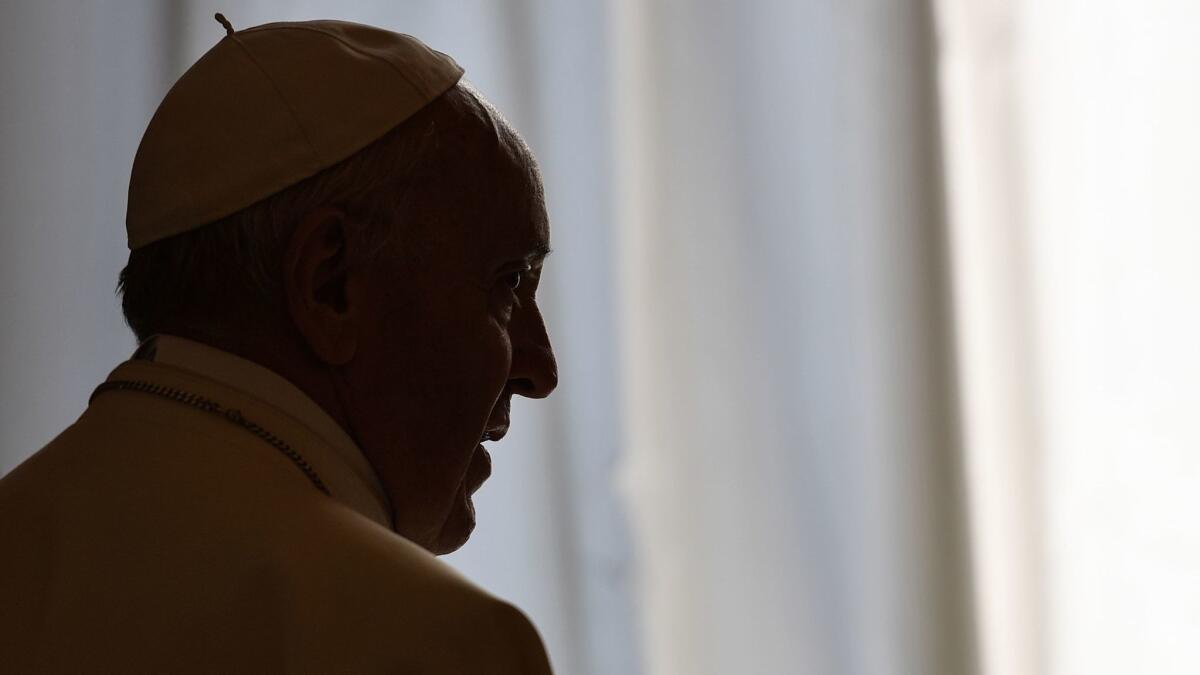Newsletter: Pope Francis has a big problem. Keeping quiet isn’t helping

- Share via
Good morning. I’m Paul Thornton, and it is Saturday, Sept. 15, 2018. Here’s the study showing that nearly 3,000 people died in Puerto Rico as a result of Hurricane Maria in 2017, a figure that President Trump says is a Democratic Party invention. Let’s take a look back at the week in Opinion.
Pope Francis had been lauded as a transformative figure in the history of the Roman Catholic Church, a leader who puts a priority on pastoral care and less, much to his critics’ chagrin, on defending every letter of church dogma. One would think that from this care for the Catholic flock would emerge a different, more open way of addressing the decades-long sexual abuse scandal that has plagued the church.
Perhaps we should think again. So far, says the Los Angeles Times Editorial Board, Francis’ tight-lipped response to an allegation by former Vatican diplomat Archbishop Carlo Maria Vigano, that he protected an American cardinal he knew was an accused sexual harasser, does not inspire confidence in this pope’s ability to handle his church’s abuse crisis:
If Pope Francis is to retain his credibility amid what one of his advisors called the church’s 9/11, he needs to answer questions about what he knew and did about the alleged sexual misdeeds of the former Cardinal Theodore McCarrick. Much more important, he needs to recommit his papacy and the church he leads to protecting the faithful — children and adults alike — from wolves in shepherds’ clothing. ...
It’s understandable that Francis might not want to dignify the criticism coming from Vigano, who belongs to an anti-Francis faction in the church and has called for the pope to resign. But this is a pope known for his plain speaking and ability to engage in self-criticism. He apologized, for example, after initially denouncing as “calumny” charges that a Chilean bishop had covered up sexual abuse by a priest. Later, Francis accepted the bishop’s resignation. He should now answer questions about whether he knew of reports about McCarrick’s misdeeds (and whether he believed them) and whether he encouraged McCarrick to resume an active role in the church.
Could it be …. SATAN? The pope’s sermon earlier this week in which he warned that the devil “has been let loose and he’s got it in for the bishops,” and that he “seeks to reveal sins, which people can see, in order to scandalize the people,” hearkens back to the old and discredited argument by church leaders that abuse allegations must be kept secret to prevent the laity from losing faith. No matter what Francis believes about the devil, writes Michael McGough, it’s “no excuse for the pope not leveling with the faithful about what he knew and what he did.” L.A. Times
What say you, attorney general? The church’s history of sex abuse implicates more than just a (very large) handful of “bad padres,” writes Gustavo Arellano; it’s also rife with law enforcement failures to help vulnerable parishioners escape harm. Still, California Atty. Gen. Xavier Becerra’s office has put out a statement neither confirming nor denying that it is investigating the state’s 12 dioceses. “That’s not good enough,” says Arellano. “The church hierarchy inflicted horrendous pain on children for decades — and it’s time that the princes of the church face justice.” L.A. Times
The Paris climate agreement? We’re still in. Jerry Brown and Michael Bloomberg, who just finished hosting the Global Climate Action Summit in San Francisco, note that the United States cannot legally withdraw from the Paris pact until 2020. And, even if this country ends up fully pulling out, enough cities and states are reducing their greenhouse gas emissions to possibly have the U.S. meet its targets under the agreement. “That kind of bottom-up leadership will continue driving progress on climate change, no matter what obstacles Washington throws in our way,” write Bloomberg and Brown. L.A. Times
Jerry Brown’s been at this for years. He’s perhaps the world’s foremost evangelist of climate-change action now, but back during his first term as governor in the 1970s, he pioneered the energy-efficiency standards that kept Californians’ demand for power in check. When faced with the prospect of signing off on a new nuclear power plant, Brown instead consulted a particle physicist. The result: new appliance rules that precluded the need for more electricity and, consequently, a new nuclear plant. The Atlantic
The California poverty paradox: Why does a Democratic-governed state with the most progressive tax policy in the nation have the highest poverty rate in America? It’s a case of, on the one hand, liberals trumpeting the growth of California’s economy while ignoring the growing gap between the rich and the poor, and on the other hand, conservatives lamenting the failure of the left to close the wealth gap while completely ignoring the state’s overall economic health. Which side is correct? New York Times
Reach me: paul.thornton@latimes.com
